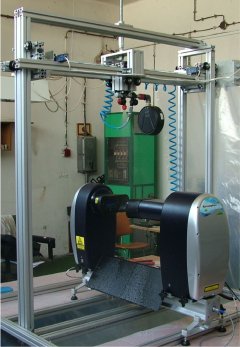Given the current high level of concern about the environmental and health risks associated with agrochemical spray use, work at the College of Kecskemét in Hungary is providing important information to help ensure the correct and controlled delivery of pesticides and other compounds. Researchers are examining how the output of spray nozzles changes during use. Their aim is to determine whether or not the nozzles continue delivering droplets in the size ranges that give the greatest efficacy with the least adverse effect. The Spraytec droplet size analyzer from Malvern Panalytical is integral to this work.
This robust system is designed to provide rapid, high resolution measurements of wide spray plumes, enabling measurement of droplet size distributions in real-time during spraying.

Professor István Sztachó-Pekáry of the Machinery Department at the College of Kecskemét said, "It is normal for farmers to use spray nozzles a number of times before replacing them. By monitoring output over time, we are developing a greater understanding of the impact of nozzle wear, enabling us to balance nozzle performance with the economics of renewal. This helps avoid the cost of premature replacement whilst also encouraging good practice in ensuring that droplet size specifications are met."
Droplet size is a critical parameter, since it plays a significant role in predicting spray drift, run-off and uptake by different target species. In using the highly robust Spraytec system, the team in Hungary has the ability to measure sprays with droplets ranging from 0.1 to 2000 microns, at data acquisition rates of up to 10 kHz. This provides rapid, in-situ data acquisition in real time during spraying. "The Spraytec provides us with significant insight into spray behaviour," said Professor Sztachó-Pekáry. "The data it generates support both the theoretical achievements on spray atomization and laboratory tests on droplet size distributions across the fan patterns of new and worn nozzle tips."
The efficient application of agrochemical sprays to minimise any adverse impact on the environment and on human and animal health is a major global concern, as reflected in the European Parliament's ruling on pesticide safety in January 2009. Being able to closely monitor the effectiveness of application systems in real time, and in particular to gauge more closely the exact timing for nozzle replacement, is likely to encourage equipment maintenance practices that result in correct application.